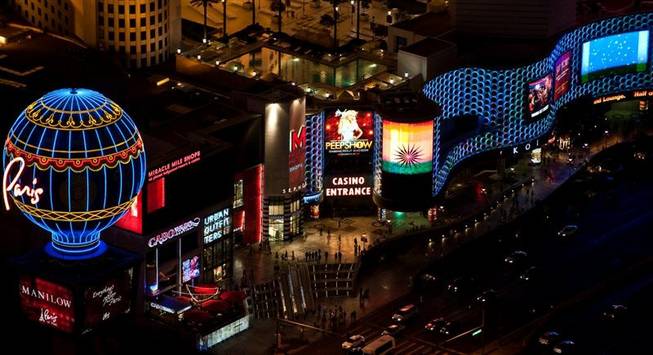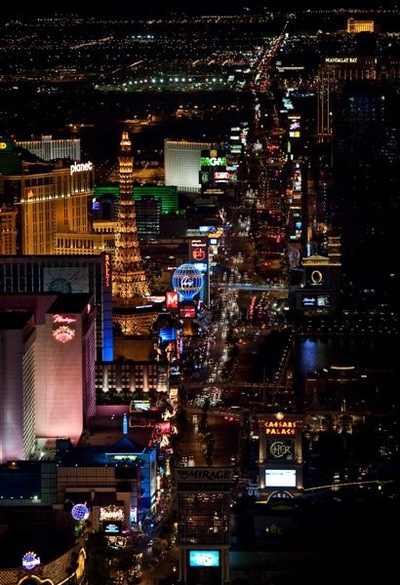Saturday, June 12, 2010 | 2:01 a.m.
Las Vegas casino operators are bracing for a difficult summer, as the desert heat keeps conventions away and hotels try to lure tourists with low rates already beaten down by the recession.
And yet, one of the world’s biggest hedge fund firms has laid a $1 billion bet that three Las Vegas gaming giants, including the two that control most of the Strip, will recover.
Paulson & Co. recently purchased 40 million shares in MGM Mirage and 4 million shares in Boyd Gaming, becoming one of the largest shareholders in both. And in a deal announced last week, Paulson will exchange previously acquired bonds in Harrah’s Entertainment for a 9.9 percent equity stake in the gaming giant.
These are many eggs in a greatly weakened basket.
All three companies have most of their investments in Las Vegas. Two of the three, while narrowly escaping the clutches of bankruptcy, racked up big debts when the economy was booming and have been forced to cut back to make debt payments with enough cash left over to maintain their business.
Hedge fund guru John Paulson is among many investors predicting economic rebound this year and next. Yet some industry watchers wonder whether Paulson placed his contrarian bet too soon given that gaming in Las Vegas has not yet recovered as much as other industries that depend on discretionary spending, such as cruise lines, theme parks and nongambling resorts.
Hedge fund managers have been called the most skilled gamblers in Wall Street’s casino. They use complex investment strategies such as short sales and derivatives to hedge risky bets and maximize returns.
And yet, gambling is a poor metaphor with which to describe Paulson & Co. At a time when most investors lost their shirts, the firm made billions of dollars betting against subprime mortgages, correctly predicting that an epic housing collapse would trigger a broader economic decline.
Paulson, who charges wealthy clients heavy fees for his exceptional returns, might best be described as a professional skeptic.
His initial bets, in 2005 and 2006, were money losers because housing prices remained strong in the face of growing evidence that lenders were peddling mortgages to homeowners who couldn’t afford them, banks were increasing their debt loads to historic levels and bond-rating agencies were signing off on investments in bad loans. Rather than cutting losses early, he stuck with his position and let it ride.
His early bet paid off in a big way when the real estate bubble finally burst and underlying problems made national headlines a year later. Paulson became one of the most successful and highly compensated investors on Wall Street.
Some analysts think Paulson isn’t too concerned with the specific challenges of Las Vegas gaming industry, such as an oversupply of hotel rooms.
Instead, analysts say he’s betting on a long-term recovery of the broader economy, a recovery in which casinos, like many other places consumers can spend money, will benefit.
Although his representatives wouldn’t comment on the casino investments, an investor conference call led by Paulson and published by MarketWatch last month revealed some of that rationale.
According to MarketWatch, Paulson said he expects the U.S. economy to rebound based on a recovering housing market, which should boost stock prices and gross domestic product.
“We’re looking for a very strong period of corporate earnings growth,” Paulson said. He also urged Americans to buy homes, saying prices are expected to rise this year and next.
(The company’s quarterly Securities and Exchange Commission filing last month revealed investments in multiple hotel and resort companies, such as Starwood and Vail Resorts, along with the casino company.)
Other theories about Paulson’s purchases abound.
Las Vegas casino companies, despite their risk profile, are one of the few sectors that offer the opportunity for the kinds of substantial returns hedge funds seek for their wealthy clients, analysts said.
The investments are no slam dunk.
Although spending in other sectors has increased, some question the strength and longevity of the latest economic boost.
The past three quarters of GDP growth was partly a function of one-time stimulus benefits like tax cuts, so whether the U.S. economy is “strong enough to stand on its own two feet” remains to be seen, said UNLV economist Mary Riddel, interim director of the Center for Business and Economic Research.
Although Boyd Gaming’s neighborhood casinos don’t depend on the health of the U.S. economy like tourism giants Harrah’s and MGM, they are indirectly bound by macroeconomic forces, as many of their customers have tourism-related jobs.
Economists analyze the past while investors bet on future events. Although some have criticized economists for not foreseeing the downturn the way some investors did, economists, unlike money managers, aren’t in the business of forecasting — which might otherwise be called skilled wagering.
Paulson’s bullish bet on casinos, like his investment in bad mortgages, might pay off by virtue of the deals’ early timing.
Otherwise, they are fundamentally different. Rather than crafting complex investment schemes to profit from the kind of homeowner failures that decimated profits in Las Vegas, Paulson’s latest move could have a restorative effect, by boosting investor confidence in companies that are just regaining their footing.



Join the Discussion:
Check this out for a full explanation of our conversion to the LiveFyre commenting system and instructions on how to sign up for an account.
Full comments policy